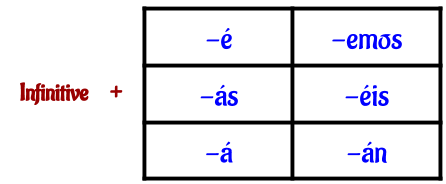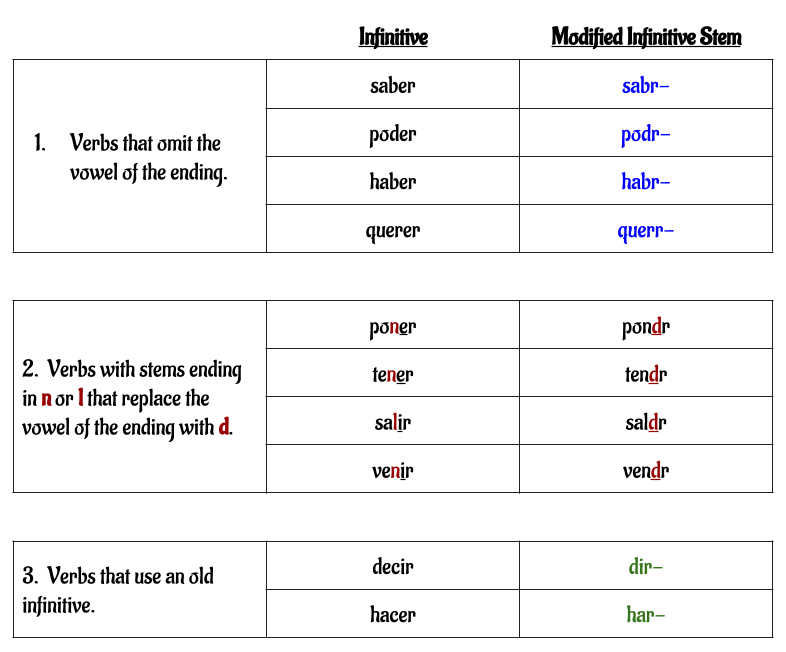El Futuro
Here is a short video that addresses the Future tense, and the Conditional. The first 10 minutes and 30 seconds addresses the Future Tense.
Future tense is used to speak about events that will or are going to happen in the future. There are two ways to refer to future events.
(1) The immediate future can be formed by using the modal construction ir a + infinitive (to be going to....).
For example:
Yo voy a leer un libro. Ella va a venir mañana.
I am going to read a book. She is going to come tomorrow.
(2) The general reference to the future is typically preceded by the helping verb will, almost as if it were a solid commitment one is making about the action. In general, we may use the Spanish future where the future is used in English.
The future tense is formed by using the infinitive form of the verb and using the endings in the chart below. Notice that for this tense, it does not matter if the verb is an -ar, -er, or -ir verb, they all use the same endings. These endings are simply placed on the end of the infinitive.
Example: Yo buscaré
- The immediate future
- Simple future actions
(1) The immediate future can be formed by using the modal construction ir a + infinitive (to be going to....).
For example:
Yo voy a leer un libro. Ella va a venir mañana.
I am going to read a book. She is going to come tomorrow.
(2) The general reference to the future is typically preceded by the helping verb will, almost as if it were a solid commitment one is making about the action. In general, we may use the Spanish future where the future is used in English.
The future tense is formed by using the infinitive form of the verb and using the endings in the chart below. Notice that for this tense, it does not matter if the verb is an -ar, -er, or -ir verb, they all use the same endings. These endings are simply placed on the end of the infinitive.
Example: Yo buscaré
Here are more examples of its use and their translations.
|
Yo hablaré con mi madre mañana.
I will speak with my mother tomorrow. Nosotros viajaremos a Madrid en el verano. We will travel to Madrid in the summer. Mi madre cocinará la cena esta noche para la familia Gómez. My mother will cook dinner tonight for the Gomez family. Mis amigos vivirán en la ciudad por los primeros seis días. My friends will live in the city for the first six days. |
Irregular Verbs
There are some irregularities among the most common verbs. Several have modifications in the infinitive; two verbs use an old form of the infinitive. All verbs use the same endings seen above.
Here are some examples of these verbs in their conjugated forms and translations.
|
Marcos vendrá mañana a hablar contigo.
Marcos will come tomorrow to speak with you. Yo no te diré una mentira. I will not tell you a lie. Cuando entras la casa, pondrás la chaqueta en el closet. When you enter the house, you will put the jacket in the closet. |
**Interesting Note:
Spanish future translates English will to indicate simple future action, but querer is needed to show willingness, if you want to ask someone to do something.
¿Me ayudarás?
Will you help me? (Are you going to help me)
¿Quieres ayudarme?
Will you help me? (Are you willing to help me?)
Spanish future translates English will to indicate simple future action, but querer is needed to show willingness, if you want to ask someone to do something.
¿Me ayudarás?
Will you help me? (Are you going to help me)
¿Quieres ayudarme?
Will you help me? (Are you willing to help me?)


